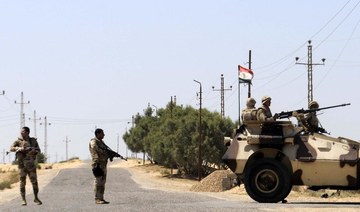CAIRO: Egyptian security forces have committed widespread abuses against civilians in restive northern Sinai peninsula, some of which amount to war crimes, Human Rights Watch (HRW) said on Tuesday, urging other nations to halt military assistance.
Egypt’s ground and air forces have been fighting Islamist insurgents in Sinai for years, in a conflict fueled by wider Middle East dynamics and a history of state neglect and oppression of the poor and isolated region.
The report accused security forces of arbitrary arrests including children, disappearances, torture, extrajudicial killings, collective punishment and forced evictions.
While there was no immediate reaction from the Egyptian government, it has in the past responded to accusations of rights abuses by saying strong security measures were needed to curb Daesh and other militants on its soil.
New York-based HRW said its 134-page report was researched from 2016-2018 and based on interviews with 54 North Sinai residents and former government and military officials, as well as official statements and satellite images.
The watchdog documented what it said were 50 arbitrary arrests of residents, including 39 cases where the detainee was held incommunicado at an undisclosed location.
Some died in custody because of ill-treatment and lack of medical care, HRW said, citing former detainees.
Reuters was unable to independently confirm its findings.
The report also documented 14 cases of extrajudicial killing of detainees, using methods that match similar cases reported in a Reuters investigation published in April.
Spokesmen for the military and for Egypt’s State Information Service, which liaises with foreign media, said they would not respond before seeing the report. A spokesman for the Interior Ministry had no immediate comment.
Conflict in the Sinai escalated after President Mohamed Morsi of the Muslim Brotherhood was toppled by the military in 2013.
Tens of thousands of North Sinai’s estimated 500,000 population have been forcibly evicted or fled, while thousands have been arrested and hundreds secretly detained, HRW said.
In February 2018, security forces launched a highly-publicized operation in North Sinai against militants loyal to Islamic State, razing property and farmland along the border with the Gaza Strip and around the town of Al-Arish.
Egypt’s military has denied mass demolitions in North Sinai and said armed forces were working within a legal framework to create buffer zones to enhance security, adding that displaced residents had been compensated.
The HRW report called on the United States, which gives $1.5 billion annually in aid, and all Egypt’s other international partners to halt military and security assistance.
HRW also documented abuses by Sinai Province, the local branch of Islamic State, which it said has attacked civilians, kidnapping, torturing and beheading perceived opponents.
Authorities have arrested more than 12,000 people while at least 3,076 alleged militants and 1,226 military and police personnel were killed in North Sinai from 2014-2018, according to the Tahrir Institute for Middle East Policy.
Egyptian security forces commit war crimes in Sinai: rights monitor
Egyptian security forces commit war crimes in Sinai: rights monitor
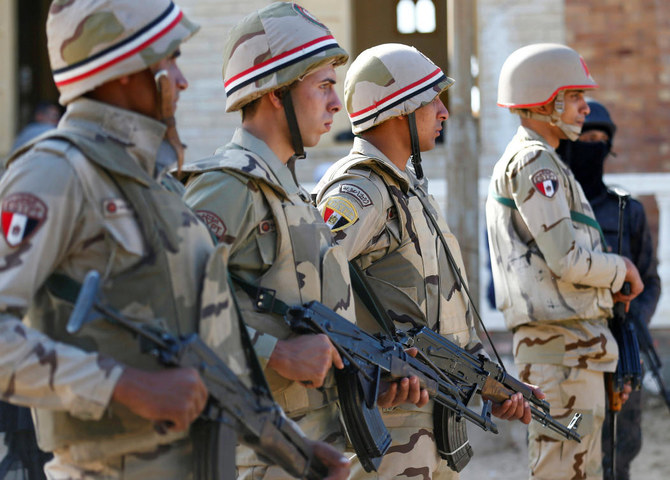
- Egypt’s ground and air forces have been fighting Islamist insurgents in Sinai for years
- The uman Rights Watch report accused security forces of arbitrary arrests
‘Beauty is needed for your soul,’ Saudi artist Nasser Almulhim says

- The Saudi artist discusses societal shifts, art as therapy, and ‘putting it all out there’
DUBAI: The emerging Saudi artist Nasser Almulhim is an open book. A little over 10 minutes into our interview, Almulhim, speaking from his studio in Riyadh, admits to dealing with mental health issues, particularly depression. He copes, he says, by deep breathing, praying, walking barefoot on the grass, and getting in touch with his spiritual side. The topic arose when I asked about his childhood in Saudi Arabia, at a time when the country was much more restrictive.
“I never confronted this question, because I always feared looking back at memories. It wasn’t an easy lifestyle for men or women,” Almulhim, who was born in 1988, tells Arab News.
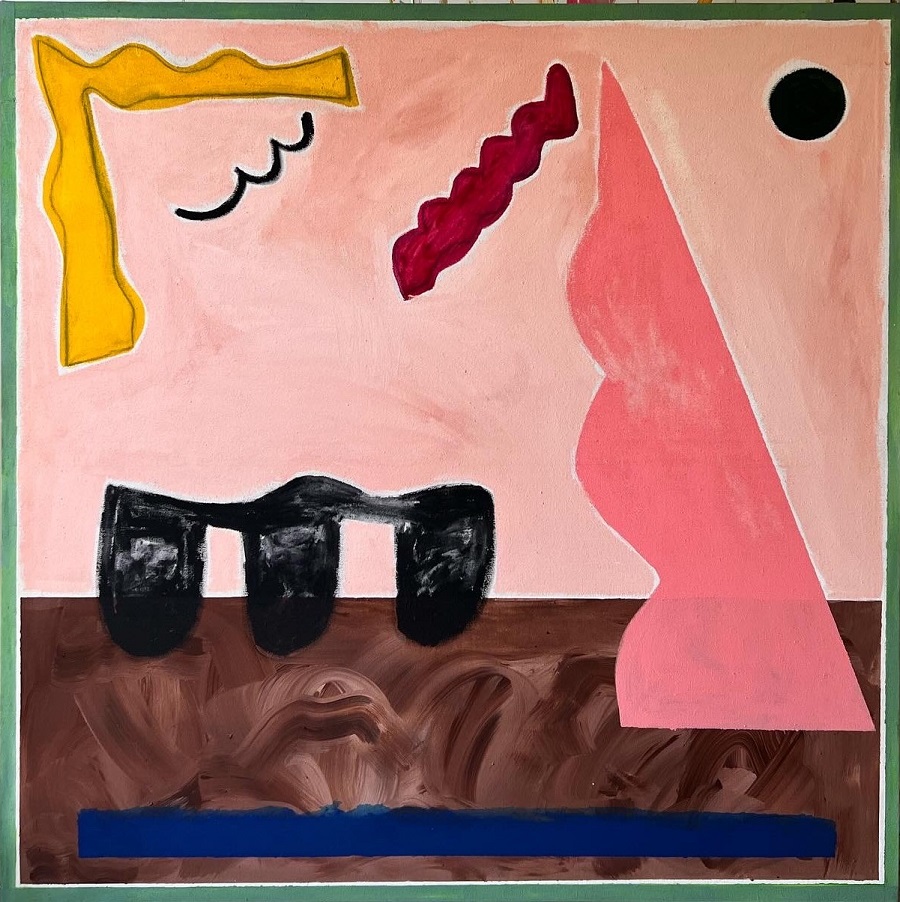
Almulhim comes from a large family of four sisters and three brothers. They were raised in Riyadh’s Al-Malaz neighborhood, largely populated by an expat community of Sudanese, Egyptians and Jordanians, according to the artist. Interacting with people of different backgrounds enriched his upbringing.
“My parents raised me well and taught me to respect people from a young age,” he says. “It was a very simple lifestyle. We didn’t have much, but my family provided us with safety and a good education. I studied in a public school and we were in the street a lot. We were playing football and we used to spray paint, just being rebellious, and the police would come,” he says. “Art was dead back in the day. It was haram.”
Despite this, Almulhim, who enjoyed math and science as school subjects, was always sketching. “My parents saw something within me,” he says. It is also possible that Almulhim, who describes himself as a visual, nature-loving person, inherited his artistic sensibilities from his family. Almulhim says his grandmother was a poet, and his father was passionate about analog photography.

“I believe he has an artistic side, but he is not embracing it,” he says. “He has a beautiful vision, even with the way he decorated the house. It came from someone who was vulnerable and sensitive.”
During Almulhim’s high school years, he started to notice how ‘different’ he was as a Saudi, compared to other Arabs in the region. “We used to travel to Syria and Lebanon,” he recalls. “In Beirut, everyone was hanging out on the beach. People were doing their thing, and then I would come back to Riyadh, and it was the complete opposite. I would ask my dad, ‘Are we outsiders?’ And he would say, ‘There is a system. This is our tradition and culture.’ So I was always trying to do the opposite.”
After graduating from high-school, Almulhim, who didn’t speak English at the time, travelled all the way to Sydney, Australia, to study intensive English courses, and later moved to the US to pursue a bachelor’s degree. “The funny part is, I went there to study engineering,” he says, adding that the men in his family were doctors or engineers. At university, he spent time with creative people studying music and theatre, and they noticed something about him.
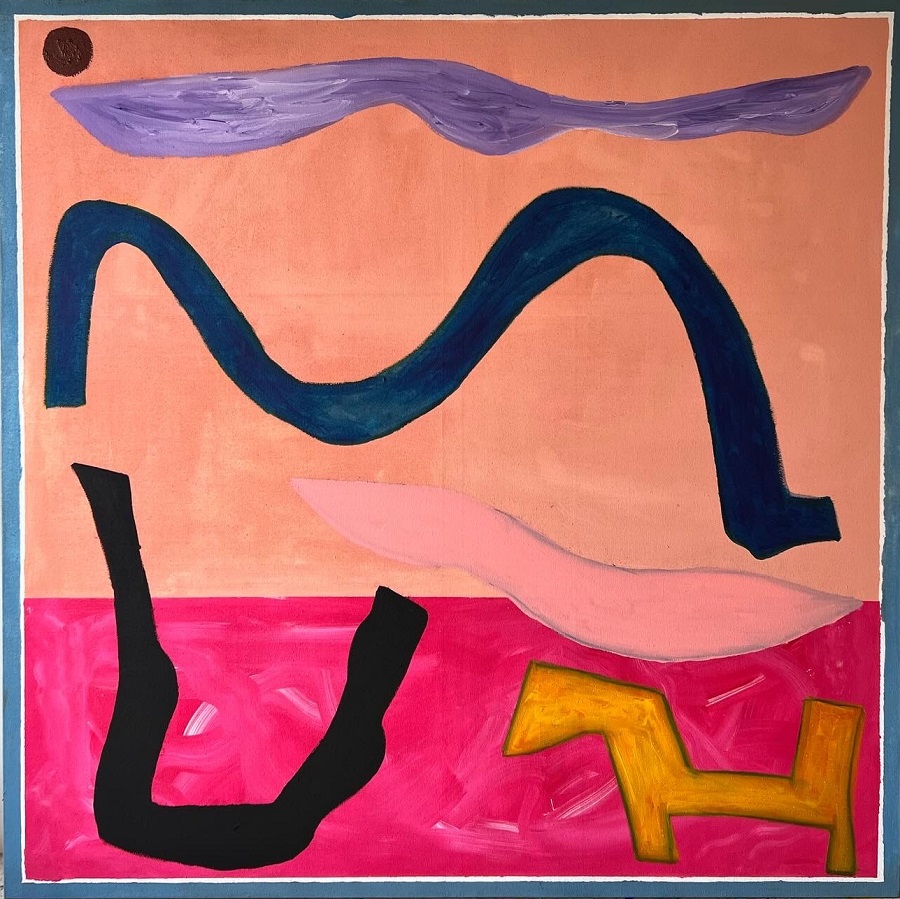
“They saw me reading books, sketching, playing the guitar, watching art documentaries, and going to museums. They were telling me to shift my major. It was a big deal for me and for my family as well. I shifted to study fine arts, and it was the best decision I’ve ever made. I felt light, I felt like myself,” Almulhim, who graduated with a degree in studio art from the University of West Florida, says.
As reflected in his colorful paintings, Almulhim isn’t afraid of embracing his feminine side, something that stems from his close relationship with his sisters.
“I always felt comfortable talking to them, even about sensitive topics, which I couldn’t talk to my parents about. There was a gap,” he says. But, it has invited criticism from male viewers. “With using pink, for example, I’ve had men ask me, ‘Why are you using pink? You’re a man.’”
He says he wants to go “back to basics” with his painting, by appreciating beauty again.
“In art, beauty is my greatest inspiration. The late Lebanese artist Etel Adnan said that, nowadays in the art scene, we’ve neglected the idea of beauty and we’re just focused on the conceptual,” he says. “People like distraction, which makes sense because we live in distraction. But I feel like beauty is needed for your soul, your physical self, and being nice to other people.”
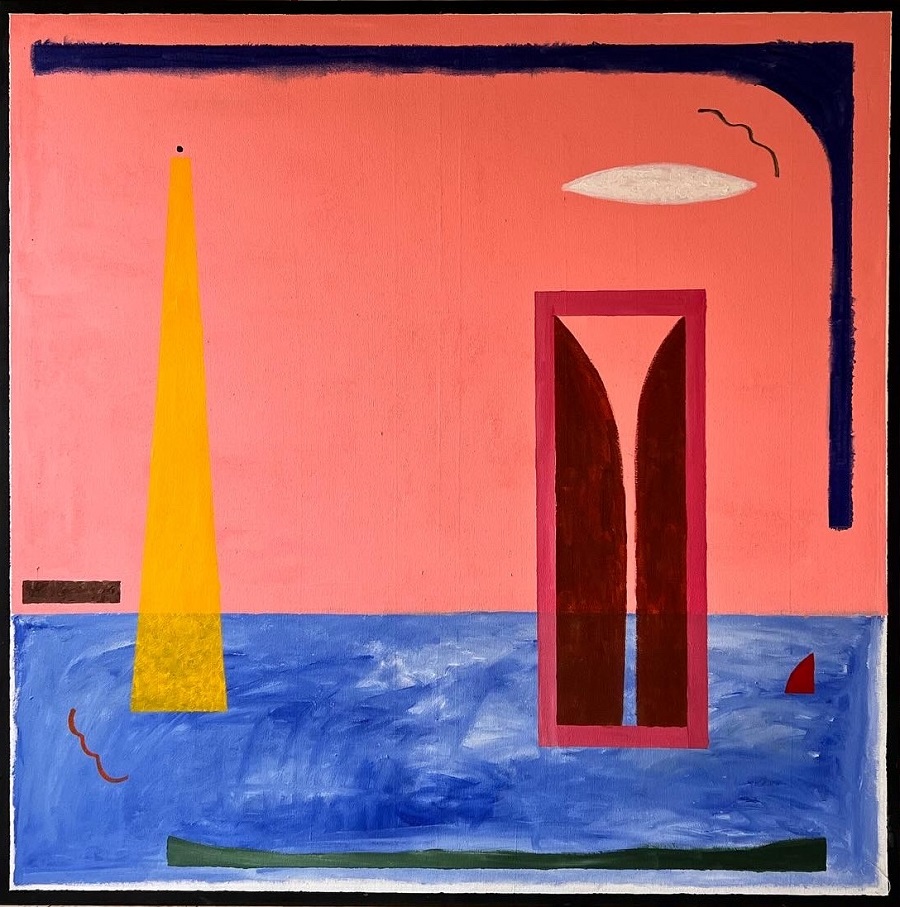
Almulhim fills his calming canvases, composed of floating geometric forms, with open spaces of color.
“In painting, I like colors that bring happiness and might heal you. It puts you in a state of mind that doesn’t numb you, but makes you disconnect from the distraction around you. I always say that art is therapy for me. Part of it is, I feel like I’m escaping, maybe from some pain that I need to heal from, and part of it is that I’m confronting that pain,” he explains, adding that he hopes to one day pursue a doctorate degree in art therapy. His paintings also contain a psychological and spiritual element, creating a universe of his own, where he is “channeling the Higher Power, Allah, this great universe, this divinity that is outside and within us.”
On June 6, Almulhim will open his new exhibition, “On In-Between,” at Tabari Art Space in Dubai. Through his new paintings, the artist is tackling the psychological stages of the subconscious, pre-consciousness, and consciousness.
“I’m telling the audience that we have to understand this world to heal and to know ourselves,” he says. “Also, it’s fine to flow between these two or three fields. I’m telling you as a humble human being, I am all of these things: My chaos, my order, my vulnerability, my beauty, my ugliness. I’m putting it all out there.”
Almulhim is also driven at this stage of his career by collaborating with fellow artists in the Arab region. He would like to set up art-residency exchanges, where artists from Iraq, Lebanon, Palestine and Jordan can work in his Riyadh space, and vice-versa. He says it was the ongoing tragedy in Gaza that sparked this idea.
“I’m an artist, but, above that, I’m a human being,” he says. “How can I help? How can I contribute? How can we learn from each other as Arabs and as citizens of the globe? I feel in our region, we are in need of this unity.”
476 Pakistani Hajj assistants arrive in Saudi Arabia to facilitate pilgrims

- This year Pakistan chose 550 individuals to assist local pilgrims during Hajj pilgrimage
- Four hundred and fifty-seven assistants are in Makkah, 19 in Madinah, says official
ISLAMABAD: Four hundred and seventy-six Hajj assistants or “Moavineen” have arrived in Saudi Arabia to assist pilgrims in the cities of Makkah and Madinah weeks before the annual Islamic pilgrimage begins, a Pakistan Hajj Mission official confirmed on Wednesday.
Pakistan selects hundreds of doctors and assistants each year to facilitate local pilgrims in Saudi Arabia during Hajj. These assistants provide Pakistani pilgrims with guidance regarding the pilgrimage, the holy sites in Makkah and Madinah as well as logistical support and medical aid if necessary.
Pakistan chose 550 individuals this year as volunteers to assist pilgrims during Hajj. In a first, candidates had to pass the National Testing Service (NTS) exam to qualify for the service.
“Five hundred and fifty support staff have been selected this year through the third-party NTS after conducting written and physical tests,” Pakistan’s director-general of Hajj, Abdul Wahab Soomro, told Arab News.
“Total 476 support staff have reached Saudi Arabia till date and out of these, 457 are performing duties in Makkah and the remaining 19 are presently posted in Madinah,” he added.
Soomro said 297 individuals have been assigned building management duties while 101 are responsible for transportation.
“Forty-five have been assigned food responsibilities, seven are in the mission’s control office, four are in the inspection cell, two are in the departure cell and one is in the lost and found cell in Makkah,” he said.
Soomro said the assistants’ deployment would be changed as per the requirements.
More than 41,000 Pakistani pilgrims have arrived in the holy cities of Makkah and Madinah since May 9, Pakistan’s Ministry of Religious Affairs has confirmed.
The month-long pre-flight Hajj operation is expected to last till June 9.
Around 179,210 Pakistanis will perform Hajj under both the government and private schemes, with this year’s pilgrimage expected to run from June 14-19.
HIGHLIGHTS: Rana Al-Mutawa’s exhibition ‘Everyday Life in the Spectacular City’

DUBAI: The exhibition, which runs until July 4 at Dubai’s Kutubna Cultural Center, features images from Rana Al-Mutawa’s book of the same name, which is subtitled “Making Home in Dubai.”
‘Flanerie’

The exhibition is billed as an “urban ethnography that reveals how middle-class citizens and longtime residents of Dubai interact within the city’s so-called superficial spaces to create meaningful social lives.”
‘Fountains’

In her book, Al-Mutawa argues that Dubai’s often-spectacular (at least in size) buildings, though regularly criticized as superficial and soulless, in fact “serve residents’ evolving social needs, transforming (these spaces) into personally important cultural sites,” perhaps disproving “stereotypes that portray Dubai’s developments as alienating and inherently disempowering.”
‘A Sense of Belonging’

In a press release, Al-Mutawa says that the work is an attempt to show that “superficial” places are “important cultural sites: ones where social and gender norms are observed and negotiated.” She adds: “I hope (the work) can generate debate about how to go about understanding these places without repeating the stereotype about inauthentic Gulf cities.”
KSrelief extends training, water, health projects in Yemen

RIYADH: The Kingdom’s aid agency KSrelief is extending its training, food and health projects for vulnerable people in Yemen, the Saudi Press Agency reported on Wednesday.
In Taiz and the Hadramout governorate, the agency launched a life-skills program for orphans and women, which including sewing, managing businesses, and maintaining mobile phones.
In Aden, KSrelief concluded a training program on community cohesion in cooperation with the UN Development Programme, covering peace committees, conflict resolution and mediation.
In addition, the aid agency distributed 634 food parcels to 4,438 individuals in Aden.
In Hodeidah, 2,600 personal hygiene bags were delivered to displaced people in the Al-Jisha and Bani Jaber camps.
KSrelief also signed a deal with a civil society organization in Taiz to dig a well in the area that would benefit 3,150 individuals.
In Socotra governorate, KSrelief signed a pact with a civil society organization to construct a tank that would supply clean water to villages.
Saudi designer Mohammed Ashi to create Riyadh Air cabin crew uniforms

DUBAI: Saudi designer Mohammed Ashi, founder of the Paris-based label Ashi Studio, is set to design the inaugural fashion line for the cabin crew of the Kingdom’s new airline, Riyadh Air, which is on track to make its maiden flight in 2025.
Ashi is set to unveil the uniform design concepts and share his inspiration for the creations at Haute Couture Week in Paris from June 22-27. The full uniform launch is scheduled for later this year.
Riyadh Air’s CEO Tony Douglas said: “The cabin crew fashion line is one of the first things our guests will see when they board our aircraft in 2025, and we are confident that Ashi’s unique designs will leave a lasting impression, ensuring the experience lives long in their memory after they have landed.
“It’s such an honor to collaborate with Riyadh Air to design the airline’s first ever cabin crew fashion line,” the designer said in a released statement. “The airline will play an important role in the future of Saudi Arabia by making Riyadh one of the world’s key destinations.
“I am delighted to be part of a project so significant for our nation. It’s an exciting time to be in Saudi Arabia and to witness another Saudi brand going global,” he added. “I am looking forward to sharing the cabin crew fashion line with the world, and to seeing the Riyadh Air team wearing my creations when it takes its maiden flight in 2025.”
Ashi became the first couturier from the Gulf region to join the Fédération de la Haute Couture in Paris as a guest member in 2023. He also became the first designer from the Gulf to be included in the BoF 500 list, the Business of Fashion’s index of the people shaping the fashion industry in 2023.
Ashi’s creations have been worn by the likes of Beyonce, Lady Gaga, Jennifer Hudson, Kylie Minogue, Penélope Cruz, Deepika Padukone, Sonam Kapoor, Queen Rania of Jordan and more.




